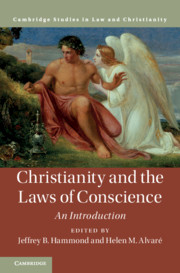Book contents
- Christianity and the Laws of Conscience
- Law and Christianity
- Christianity and the Laws of Conscience
- Copyright page
- Dedication
- Contents
- Contributors
- Acknowledgments
- Introduction
- Part I Themes in Understandings of Conscience in Christianity
- Part II Conscience According to Major Figures and Traditions
- Part III Applied Topics in Law and Conscience
- Index
- References
Part I - Themes in Understandings of Conscience in Christianity
Published online by Cambridge University Press: 12 June 2021
- Christianity and the Laws of Conscience
- Law and Christianity
- Christianity and the Laws of Conscience
- Copyright page
- Dedication
- Contents
- Contributors
- Acknowledgments
- Introduction
- Part I Themes in Understandings of Conscience in Christianity
- Part II Conscience According to Major Figures and Traditions
- Part III Applied Topics in Law and Conscience
- Index
- References
Summary

Information
- Type
- Chapter
- Information
- Christianity and the Laws of ConscienceAn Introduction, pp. 21 - 90Publisher: Cambridge University PressPrint publication year: 2021
